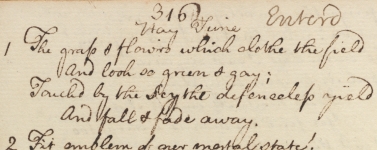|
Olney Hymns Book 2 Hymn 35
The grass, and flowers, which clothe the field...
Manuscript Hymn No. 316

SEASONS
Hay-time
The grass, and flowers, which clothe the field,
And look so green and gay,
Touched by the scythe, defenceless yield,
And fall, and fade away.
Fit emblem of our mortal state!
Thus in the scripture glass,
The young, the strong, the wise, the great,
May see themselves but grass. (a)
Ah! trust not to your fleeting breath,
Nor call your time your own;
Around you see the scythe of death
Is mowing thousands down.
And you, who hitherto are spared,
Must shortly yield your lives;
Your wisdom is, to be prepared
Before the stroke arrives.
The grass, when dead, revives no more;
You die, to live again;
But oh! if death should prove the door
To everlasting pain.
Lord, help us to obey thy call,
That, from our sins set free,
When like the grass our bodies fall,
Our souls may spring to thee.
(a) Isaiah 40:7
 |
|
from John Newton's Diary, relevant to this hymn:
Sunday 5 July 1778
The day unusually hot for this climate. I think I have seldom seen the thermometer higher on the coast of Africa. Expected much thunder, but the squalls passed us both eastward and westward – so that our services were not interrupted. Thou art merciful in this respect to the fears of many of thy poor people here.
Tuesday 7 July 1778
A few days since my spirit seemed a little upon the revival but now declined and stupid again. A poor creature, my Lord pity me. Variously employed, and alas! to little purpose. Had a favourable time at the Great House, where entered upon 1 Peter 4. There were present besides Mr Scott and Jones a Mr [left blank], Curate of Cranfield. I know not who he was, but I fear he heard to little purpose. It seems he was for a time under Dr Conyers, and has some notion of Gospel truths, but shows by his conduct he has no acquaintance with their power. O Lord teach him, and O teach me, for I have much to learn in this respect. I know enough to condemn me, if thou wast strict to mark what is amiss.
Wednesday 8 July 1778
This afternoon at Emberton – very dull – but found as opportunity of speaking a little to the good women who were met together at Mrs Barringer’s.
Thursday 9 July 1778
Met the children and found a little liberty in speaking to them towards the close. Mr Scott drank tea. I preached in the evening; the text like some of the former, seemed not to promise a copious subject but thou didst help me to deliver some suitable truths. O may thine own presence and power make them useful.
Hebrews 11:22
Friday 10 July 1778
This afternoon went through Clifton to the Mill. My spirit was cold and dissipated. It was not such an opportunity as I wished. Too much company usually spoils conversation. But I felt cause for thankfulness, that we were preserved from every harm by thy goodness, and that my _[dear Mary] is so well.
Saturday 11 July 1778
Answered a letter received from Haddington in Scotland. Thou honourest me abroad – and givest me a name amongst the people, so that I am sometimes consulted from afar. O Lord how much reason have I to abase myself – how different am I, from what I appear to some of thy children. A short interrupted walk in the evening, but I did in brief commend myself to thy teaching and blessing for the morrow, and seemed to close the week with praise for all thy mercies.
Sunday 12 July 1778
I praise thee for another of thy days and support through it. In the afternoon I entered upon a consideration of the principal points of the Reformation doctrine – Popery has of late gained more liberty and it has a seat in our Neighbourhood – that I thought it might me[be] seasonable and expedient to revert to first principles. Lord do thou give me wisdom and words.
Luke 24:47
2 Timothy 3:16
Hymn No. 316
[On this date Newton preached from the above texts at his church, St Peter & St Paul, Olney, during the morning and afternoon services, and from this hymn at the informal evening service] |
|
|
Image copyright:
Hymn: MS Eng 1317, Houghton Library, Harvard University
|
Marylynn Rouse, 11/09/2013
|
|
|
|